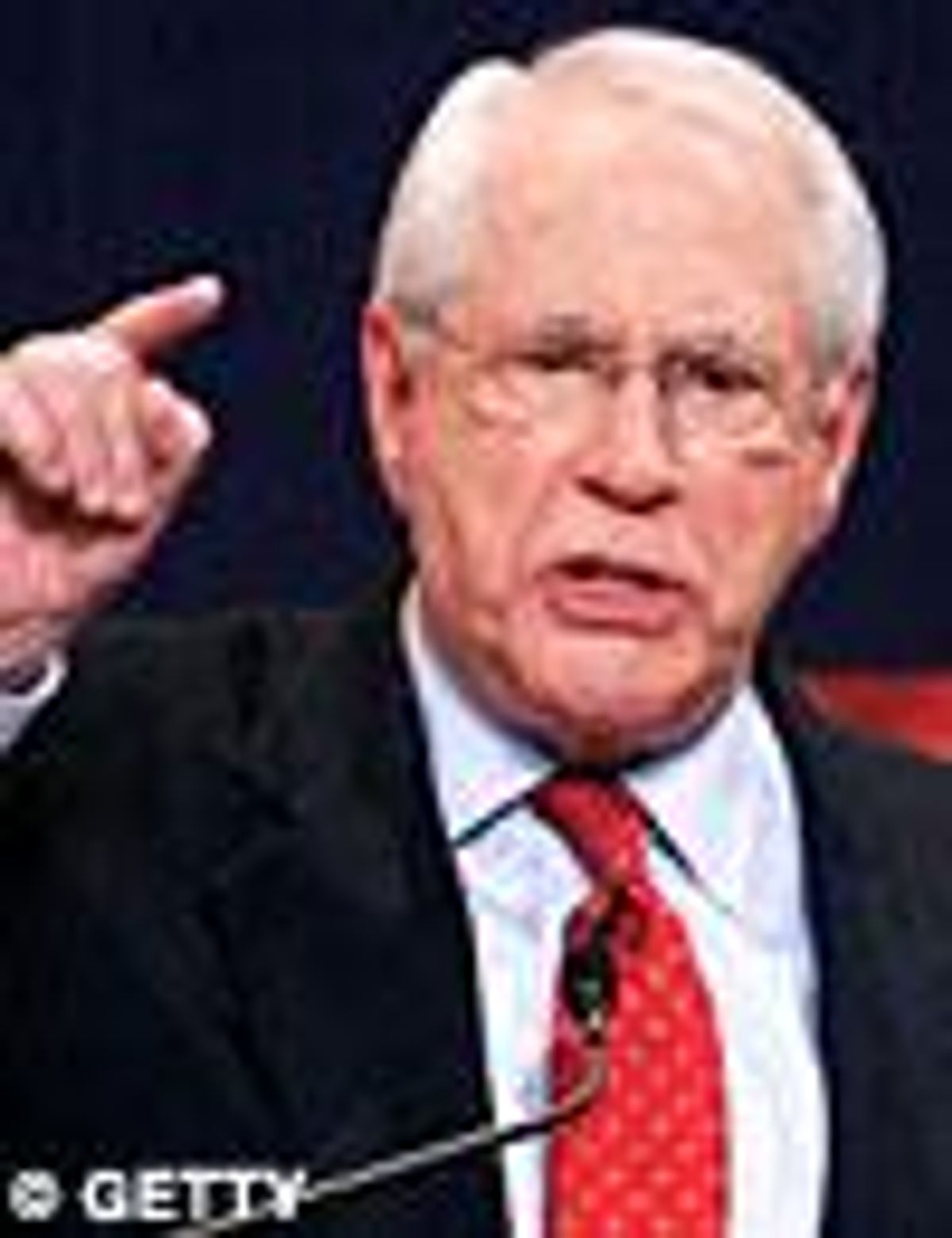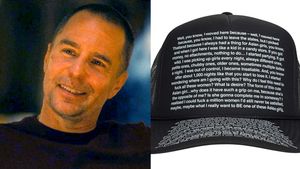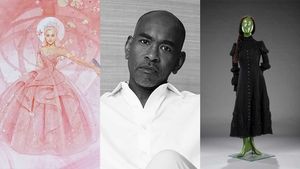Mike Gravel
became a cinematic sensation via an unlikely
three-minute video on YouTube that was picked up by Jon
Stewart on The Daily Show in mid June. Gravel, a
former Democratic senator from Alaska and the darkest
of dark horses in the presidential race, stares
point-blank into a camera with a lake and a walkway in
the backdrop. He stares...and stares. His lips quiver
slightly, but his gaze stays locked. After 70 rather eerie
seconds of silence, he turns around, picks up a rock
with both hands, heaves it into the lake, and walks
away.
The video reminds
me a bit of a self-portrait assignment I was once given
in a college photography class. One guy presented a stark
black-and-white picture of a toaster lying on the
sidewalk and explained that, somehow, it was a
metaphor for his life. Only difference is, Gravel's
running for president of the United States and his
masterwork has been viewed over 160,000 times.
It's not quite Obama Girl at 2 million hits to date,
but combine it with clips of him in the
South Carolina Democratic debates, and
Gravel's YouTube airtime is approaching that of Sen.
George Allen's "macaca" gaffe during
the 2006 midterm election.
Prior to the
first presidential debate in South Carolina this April,
barely a soul had heard of the 76-year-old Mike Gravel, let
alone the fact that he was a candidate. He made an
impression there--his demeanor frank, comical,
and angry at turns. He allowed as how all the top-tier
candidates "frighten" him and said that he was
embarrassed by the actions of the
Democratic-controlled Congress. After he hadn't been
asked a question for quite some time, he noted that he
was beginning to feel like a "potted
plant" on the stage.
Watching him
wasn't much different from watching the video: the
experience was provocative yet slightly disturbing. His
break with political etiquette was so complete that
even his polished political rivals on stage were left
wondering whether to laugh or not when his
angry-old-man routine came out.
Even his wife of
23 years, Whitney Gravel, said at the time, "As a
spouse, I was uncomfortable because his passion came through
as anger. I was concerned people would only see the
anger and not understand the passion."
Perhaps Senator
Gravel was channeling the Democratic base, because a
steady stream of small checks started rolling in, totaling
about $100,000 within a month, according to his
aides--$75,000 more than he had raised up to
that point.
"I get
really touched as I open up these envelopes," said
Mrs. Gravel. "One guy sent a check and in the
little description part he just wrote the word
Truth."
As the checks
flowed, so did the radio and interview offers, and thus the
"Rock" was born along with Gravel's
fledgling candidacy.
That's
when, given the airtime, Gravel started saying some pretty
interesting things about gays and lesbians and homosexuality
in general.
In an appearance
on The Colbert Report with Stephen Colbert in
May, Gravel gave this explanation for why
"don't ask, don't tell"
was a counterproductive policy: "If you have any
knowledge of history--ancient history--in
Sparta they encouraged homosexuality because they
fight for the people they love, and if it's your
partner and you love him, then you're prepared to die
for him. It's the same ethic in the military today.
It's not [about] the country--it's [about] my partner
who's sharing my foxhole with me."
Intriguing,
albeit a little weird, but that was just the beginning.
Since then Gravel has said that if he was elected
president, he would not only repeal
"don't ask" but would issue an
executive apology to all the gays and lesbians who
were forced to serve in the closet under the policy.
"People need to know that they've been
wronged," Gravel says.
He is also
unabashedly pro-marriage equality. After the New
Hampshire debate in early June, where he wasn't
quite as fiery--nor as effective--as in
South Carolina, he told me that if he had been given the
stage time, he would have said that civil unions
aren't good enough. "I wanted to give
the definition of marriage--marriage is nothing but a
commitment of two human beings in love. I don't
care if it's two women, two men, or a man and a
woman--it's a commitment of love."
And on that note,
Gravel even ventures to talk at length about gay love.
"Love between a man and a woman is beautiful, love
between a woman and a woman is beautiful, love between
a man and a man is beautiful too," he said.
"What this world needs is a lot more love."
Gravel's
attitude and apparent sincerity are music to the ears of
many gay Americans, especially younger ones. After a
New York event held for Gravel by Queerty.com,
21-year-old Sophia Hoffman said it was
"heartening" to hear a candidate who speaks
about gay issues with such candor.
"In my
weaker moments I get misty," Hoffman said,
"but I don't know if I believe that
someone who might run the country could say the things
he's saying."
Point taken, but
for LGBT people as well as other interest groups such
as the antiwar movement, the question is not whether he
can win but whether he can alter the debate.
The first of
Gravel's two main platforms is ending the war in
Iraq. He argues that the Congress and, most important,
his presidential challengers Hillary Clinton and
Barack Obama, say they want to end the war but
aren't using the full power of their positions to
make that happen.
But unlike Dennis
Kucinich--the candidate who probably has the most
street cred among peace activists--Gravel
isn't talking about impeaching anybody. That
would take too long and, to be frank, is a bit too
conventional for Mike Gravel, who is nothing if not
inventive to the point of eccentric in his approach to
legislating. Back in 1971, when President Nixon's
Justice Department blocked TheNew York Times from reporting on a classified
study about government deception in the Vietnam War, Senator
Gravel put the study on public record by reading
aloud about 4,000 pages of what came to be known as
"The Pentagon Papers."
Gravel also pans
the idea of voting to cut off funding for Iraq--a
tactic he tried as the Senate cosponsor of a
resolution to defund Vietnam that couldn't muster the
votes.
Instead, he
suggests Congress should pass a law that requires the
president to bring home the troops, which he argues that
Congress has the constitutional power to do.
Strategically, it plays out like this: The Democrats
have the votes in the House to pass the bill. In the Senate,
majority leader Harry Reid would start forcing a vote on the
bill once every day, over and over again, which would
shine a spotlight on all the senators who were voting
against it. With a little help from the media and
antiwar activists, Gravel guesses it would take about 20
days for enough senators to feel the heat, cave in,
and pass the bill. And after Bush exercises his veto
power, you just run the whole drill again.
It's an
impossibly pragmatic plan in that it forces elected
officials to vote the will of the people by
threatening them with the one thing they're not
willing to risk--not getting reelected. But like many
of Gravel's ideas, it barely stands a chance of
gaining popular support even though it could produce
what voters say they want.
Gravel knows how
to work the system, and with little chance of winning,
he can say almost anything, which should make for a deadly
combination. Where he falls short is in making his
concepts comprehensible to the average American.
Impeachment is an
idea most Americans understand, however vaguely.
Forcing a vote in the Senate every day until you reach
cloture, then again until you override a veto and
eventually pass a bill to create what Gravel calls a
"constitutional crisis" between the president
and Congress--now that's a tough sell,
even to a middle-class American with a college degree.
The same thing
could be said of his second platform, a pet project
he's been cooking up for about 15 years called
"The National Initiative," which would
essentially allow average citizens to bypass Congress in
order to put up their own proposals for popular vote. This
particular initiative would require a real leap of
faith for gays and lesbians because it would
essentially allow the masses to vote on our rights.
One of the
fundamental principles of our democracy is that it protects
"the minority from the tyranny of the
majority." The Constitution provides
fundamental rights to individuals, and the framers
deliberately devised a representative government
rather than a direct democracy so that those rights
wouldn't be subject to popular opinion.
But Gravel argues
that, given the chance and the proper structure, the
people would enact laws with more fair-mindedness and
integrity than elected officials who are beholden to
special interest groups.
"You have
to trust the people," said Gravel, noting that
Switzerland, one of the most harmonious and peaceful
nations in the world, uses the system he's
suggesting. "What distinguishes them is that
they've brought the people into partnership
with the government," he told the crowd at the
Queerty event.
To his point,
polls clearly show that a majority of Americans support
allowing gays to serve openly in the military, protecting
our rights in the workplace, and adding sexual
orientation to federal hate-crimes legislation. In
fact, those issues have polled well with a majority of
Americans for several years, and elected officials are just
now catching up. Gravel goes so far as to say that
voters would legalize same-sex marriage by
referendum--a stretch, according to the polls. Civil
unions, maybe; marriage, probably not.
Nonetheless, the
prospect of enacting the national initiative has left
some LGBT crowds queasy. Though Gravel was well received by
the Queerty contingent, his ideas were still a bit
radical for some. One woman mumbled, "If
he's elected, we're in trouble."
Gravel is nothing
if not a believer. As his wife, Whitney, put it,
"There are dreamers in life, and there are good
administrators. He's a dreamer, and I think the
only people who can change the world are dreamers."
To that end,
Gravel, who is quite good-humored and warm in person,
doesn't seem to mind that he's upsetting
people as long as he's stirring things up. As
he told the Queerty crowd while they cradled their drinks,
"I don't mean to scare you, but this is how I
talk when I'm sober."
One young
questioner on YouTube asked whether it was a good thing that
some people see the Rock as "disturbing."
"If
looking at me and what I'm trying to convey in this
election is disturbing, the answer is yes,"
answered Gravel. "When we stop and think of
what it's costing in human life in this Iraq war, and
the Democratic leadership and my colleagues running
for president don't lift a finger to end
it--that's disturbing, yes. That's
what's in my eyes if you look very closely.
I'm angry."
But it remains to
be seen how much of a ripple effect Gravel's
candidacy will really have.

















































































